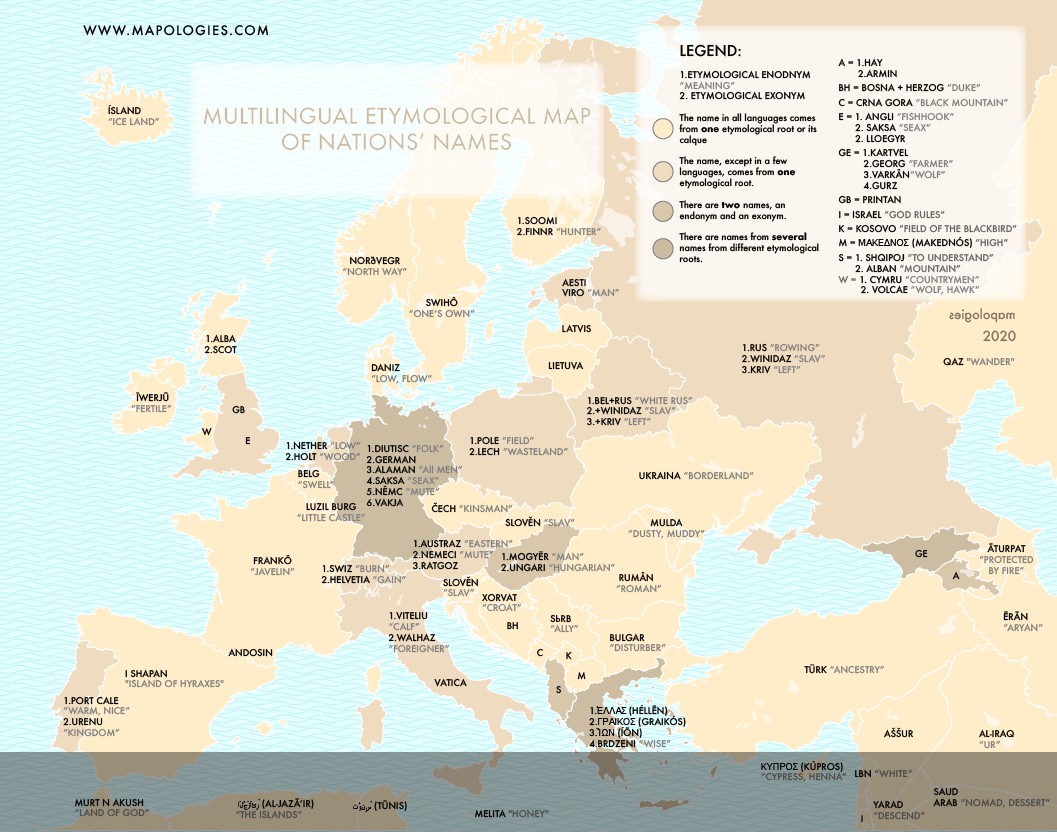Multilingual Etymological Map of Nations' Names


David Chen
Data Visualization Specialist
David Chen is an expert in transforming complex geographic datasets into compelling visual narratives. He combines his background in computer science ...
Geographic Analysis
What This Map Shows
The "Multilingual Etymological Map of Nations' Names" offers an intriguing look into the origins and meanings behind the names of countries around the globe. Each name tells a story, often revealing historical, cultural, and linguistic ties that span centuries. The visualization highlights how different languages and cultures have influenced the naming of nations, showcasing the rich tapestry of human language and history. From the ancient Greek names to modern interpretations, this map serves as a linguistic journey through time and geography.
Deep Dive into Etymology of Nations' Names
Etymology, the study of the origin of words and how their meanings have evolved, provides a fascinating lens through which we can examine the names of countries. The names we use today often reflect the history of the land, its people, and the various influences that have shaped it over time. For instance, the name "Germany" derives from the Latin term "Germania," which the Romans used to describe the tribes living east of the Rhine River. This term itself may have originated from a Gaulish word meaning "the people".
Interestingly, names can vary dramatically from one language to another, often providing insight into the characteristics or history of a nation. Take the name "Japan," which comes from the Chinese word "Rìběn," meaning "origin of the sun." This name reflects Japan's location to the east of the Asian continent, where the sun rises. In contrast, the name "Nihon" is often used domestically, maintaining a similar meaning. Such variations highlight how different cultures perceive and represent the same entity.
Another compelling example is the name "Egypt," which comes from the ancient Greek "Aigyptos," itself derived from the ancient Egyptian phrase "Hwt-kA-Ptah," meaning "house of the soul of Ptah," referring to the ancient city of Memphis. This intertwining of cultures illustrates how the historical context can shape the language and names we use today.
Moreover, many countries are named after geographical features, individuals, or significant historical events. For example, "Argentina" comes from the Latin word "argentum," meaning silver, reflecting the early European desire for silver in the land. Similarly, "Montenegro" translates to "Black Mountain" in Italian, aptly describing the dark, rugged mountains that characterize this Balkan nation.
Regional Analysis
When looking at the multilingual etymological map, we can discern fascinating regional patterns. In Europe, for example, many country names derive from Latin or Greek roots, reflecting the profound influence of the Roman Empire and ancient civilizations. Countries like Italy and France have names that are steeped in their Latin origins, showcasing the linguistic legacy of the Romans.
In contrast, names in Asia often reflect local languages and historical influences. For instance, the name "Thailand" translates directly to "land of the free," highlighting the nation’s historical independence. On the other hand, countries like Afghanistan derive their names from the dominant ethnic group, the Pashtuns, with the suffix "-stan" meaning land in Persian.
Interestingly, in Africa, many nations have names that reflect colonial histories. Countries such as Zimbabwe derive their names from indigenous languages, but the colonial history has also left its mark. The name "Zimbabwe" comes from the Shona word for "large house of stone," referring to the ancient Great Zimbabwe ruins. This is a poignant reminder of the rich cultural heritage that persists despite colonial influences.
Significance and Impact
Understanding the etymology of nation names is not just an academic exercise; it has real-world implications. Names can influence national identity, cultural pride, and even international relations. For instance, the naming of countries often reflects a struggle for recognition and sovereignty, as seen in the case of many post-colonial nations that have reclaimed their indigenous names.
Moreover, as globalization continues to blur borders, the multilingual aspect of country names serves as a reminder of the diverse narratives that coexist within our world. A country’s name can evoke feelings of belonging or alienation, shaping how people view their identity in a global context. Have you ever noticed how the pronunciation of a country’s name changes in different languages? This linguistic diversity is a testament to our interconnectedness.
As we look to the future, the evolution of country names may continue in response to socio-political changes and cultural shifts. The ongoing dialogue about decolonization and the reclamation of indigenous identities is likely to influence how nations are named and perceived. In a world that is constantly changing, the etymology of nations' names remains a vital aspect of understanding our shared human experience.
In conclusion, the "Multilingual Etymological Map of Nations' Names" is not only a visual representation of linguistic diversity but also a portal into the stories that shape our world. By examining the names of nations, we gain insight into our collective history and the complex interplay of culture, language, and identity that defines humanity.
Visualization Details
- Published
- August 2, 2025
- Views
- 190
Comments
Loading comments...